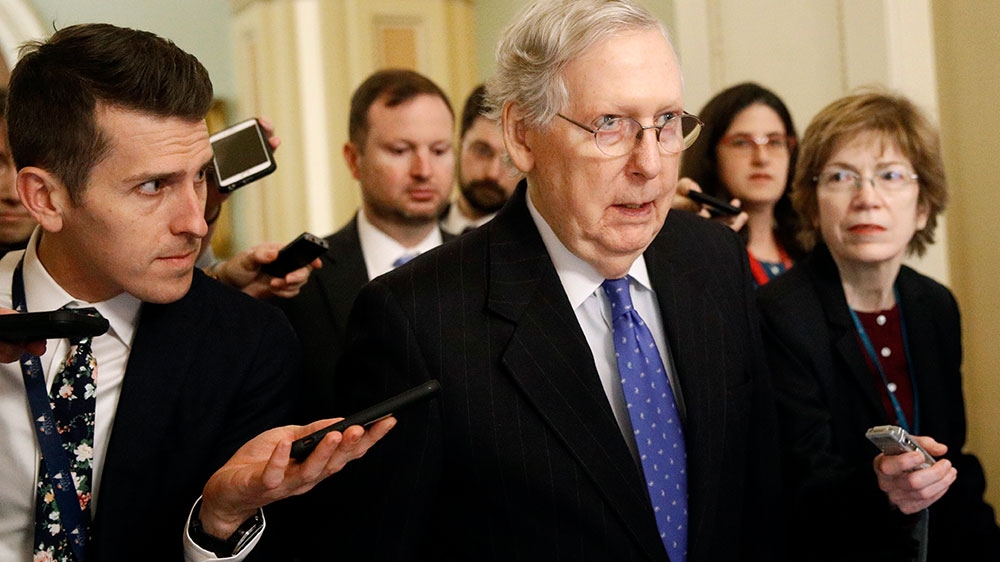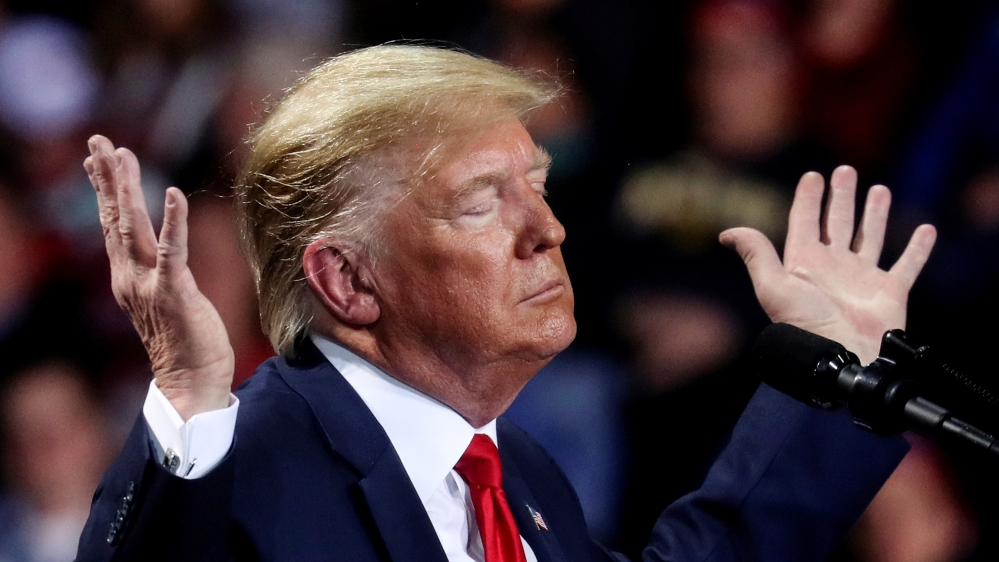Trump impeachment trial: Five questions answered
Why has Pelosi delayed sending the articles of impeachment? What happens once the Senate gets them? When will the Senate hold a trial?

Washington, DC – The United States House of Representatives is expected this week to send over the articles of impeachment against President Donald Trump, triggering a trial in the Senate.
The move is expected on Wednesday, more than three weeks after the House voted to impeach Trump for obstruction of Congress and abuse of power related to his dealings with Ukraine.
Keep reading
list of 3 itemsTrump is impeached: What happens next?
Trump impeachment: Republicans, Democrats spar over next steps
The House will also name managers to act as prosecutors in what’s expected to be a weeks-long trial that will likely end in an acquittal.
As the House prepares to transmit the articles of impeachment, here are five things you need to know:
1. Why has Pelosi delayed sending the articles of impeachment?
When the House voted on December 18 to impeach Trump, the expectation was that the articles would be sent to the Senate right away.
Pelosi surprised many by saying she would withhold sending the articles until Senate Republicans agreed to a “fair process” for the trial.
Senate Majority Leader Mitch McConnell had appeared on Fox News’s Hannity talk show with Sean Hannity, a political commentator close to Trump, to say he would conduct the trial in close alliance with the president.
That raised fears among Democrats that McConnell would use his Republican majority to move for an early dismissal of the House’s case, allowing Trump to claim exoneration.
By delaying the articles for nearly a month, Pelosi put a political spotlight on discussions between McConnell and his Democratic counterpart in the Senate over how the trial would be conducted.
Notably, Democrats see former National Security Advisor John Bolton and acting White House Chief of Staff Mick Mulvaney as key witnesses who could describe first-hand how Trump pressured Ukraine. Both were prevented by Trump from speaking to House impeachment investigators. Bolton has since said he would testify if the Senate issued a subpoena.
McConnell claimed victory in the short term with support from all 52 other Republicans for a trial rules package that defers decisions on calling witnesses until after the president’s lawyers mount their defence.
But the game is just beginning. Democrats say they successfully did what they had set out, at least in part, to do.
“What we think we accomplished in the past few weeks is that we wanted the public to see the need for witnesses,” Pelosi said Sunday on the ABC News programme This Week. “Now the ball is in their court to either do that or pay the price.”

A new national poll by Quinnipiac University found that two-thirds of Americans – 66 percent – want to see Bolton testify in the Senate trial.
Democratic Minority Leader Chuck Schumer will force votes on the question of calling witnesses, and that will put pressure on a number of vulnerable Republican senators to vote with Democrats.
2. When will the articles be sent? What happens after the Senate has them?
The House is expected to vote on Wednesday on a resolution to send the articles to the Senate, Democrats said following a meeting with Pelosi on Tuesday. Pelosi on Wednesday is also expected to name the House members who will serve as “managers”, or prosecutors of the case against Trump. The managers will carry articles to the Senate after the resolution passes.
Once the Senate receives the articles, that will trigger Senate rules allowing a trial to begin, likely the week of January 19.
Under the US Constitution, the Senate is required to conduct a trial. The chief justice of the Supreme Court presides. A two-thirds vote of senators – 67 out of 100 – is required for conviction.
In 1986, the Senate adopted rules mandating that impeachment trials run six days a week except Sundays until concluded and that proceedings must be open to the public, unless the Senate decides otherwise.
3. What is the Republicans’ plan?
McConnell has indicated that he plans to bring forward a rules package setting up the trial that looks a lot like the rules the Senate agreed to in the impeachment trial of former President Bill Clinton in 1998.
Unless much changes in the case of Trump, there will broadly be three phases to the trial. The House managers will open by presenting their case in support of the two articles of impeachment. The president’s defence team will then argue in rebuttal.
After both sides have presented, senators will then submit questions in writing to the managers and the defence. Once those are asked and answered, the trial will be open to motions to dismiss, or call witnesses.

Some of Trump’s allies in the Senate also plan to move for a quick dismissal of the charges, which would only require 51 votes.
But Senator Roy Blunt, a top Republican who had previously endorsed an “outright dismissal”, said on Monday that Republicans do not have the votes needed for a dismissal.
“I think our members generally are not interested in a motion to dismiss. … Certainly there aren’t 51 votes for a motion to dismiss,” Blunt was quoted by The Hill newspaper as saying.
Instead, the trial would end with either a vote on whether to acquit or convict Trump.
The whole affair could be wrapped up in two weeks, unless a group of four or more Republicans break with their party to reject an early dismissal and vote for witnesses and evidence.
4. Do all Democrats agree with their party’s position? Do all Republicans?
For the most part, views in Congress on the impeachment of Trump fall along partisan lines reflecting public opinion, which is sharply divided.
National polls on average show 83 percent of Democrats support impeaching and removing Trump from office while only eight percent of Republicans agree, according to a running tally by FiveThirtyEight.com.
There were a few outliers on both sides when the House voted to approve articles of impeachment.
Senator Justin Amash, a former Republican and celebrated young conservative, came out in favour of impeachment early in the process. He dropped his affiliation with the Republican Party and became the House’s only independent.
Without Republican support, Amash’s re-election prospects in a conservative district in Michigan now are slim. No Republicans risked their political futures by voting for the articles of impeachment in the House.

Democratic House members Jeff Van Drew and Collin Peterson voted against the articles of impeachment. Van Drew left the Democratic Party and will run for re-election in New Jersey as a Republican with Trump’s endorsement.
A member of Congress since 1991, Peterson represents a conservative Minnesota district that voted overwhelmingly for Trump in 2016.
Long-shot Democratic presidential candidate Tulsi Gabbard from Hawaii voted “present” on impeachment, neither for nor against.
Democrat Jared Golden, representing a conservative area of Maine, split his vote in the House, voting to charge the president with “abuse of power” but not “obstruction of Congress”.
On the Senate side, there at least seven Republicans to watch, including moderates like Lisa Murkowski and Susan Collins. They may break with the majority of Republicans and vote for witnesses to be called. There are at least three Democrats – including two up for re-election in conservative states – that have not indicated how they will vote on impeachment.
5. What about Trump? What does he say?
Regardless of what the Senate does, impeachment by the House is a stain on Trump’s legacy and his ego. He has railed against Pelosi and House Democrats on Twitter, during political rally speeches and in remarks given at public events with foreign leaders at the White House.
“Why should I have the stigma of Impeachment attached to my name when I did NOTHING wrong?,” he tweeted over the weekend. “Read the Transcripts! A totally partisan Hoax, never happened before. House Republicans voted 195-0, with three Dems voting with the Republicans. Very unfair to tens of millions of voters!”

Trump’s handling of impeachment differs sharply from that of Clinton, who sought to ignore the impeachment process and instead focused on doing his job as president, for which he was rewarded with public support and acquittal.
From the beginning, Trump has dismissed impeachment as a “witch-hunt”. He refused to allow White House officials to testify during the inquiry and tried to block House investigators from obtaining government documents and emails.
Trump and his allies have actively characterised the House process as unfair and partisan, claiming the president was not allowed to have lawyers, call witnesses or ask questions of witnesses. Democrats, however, gave the president and his attorneys opportunities to participate in proceedings, which Trump refused.